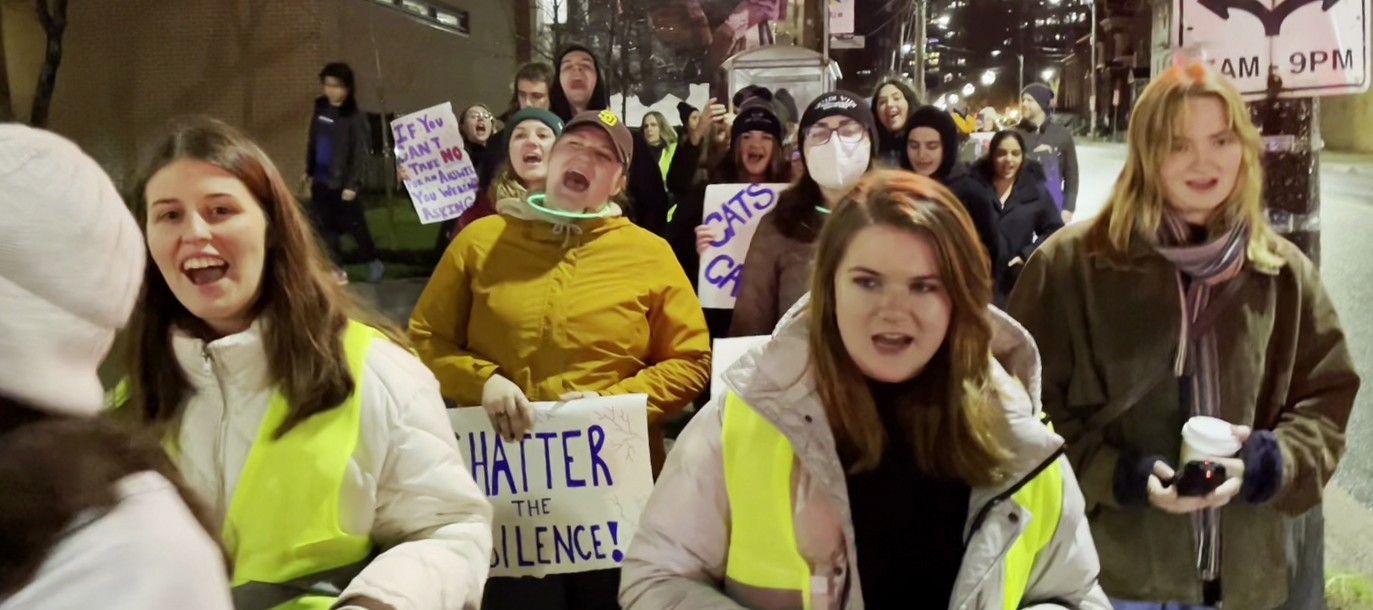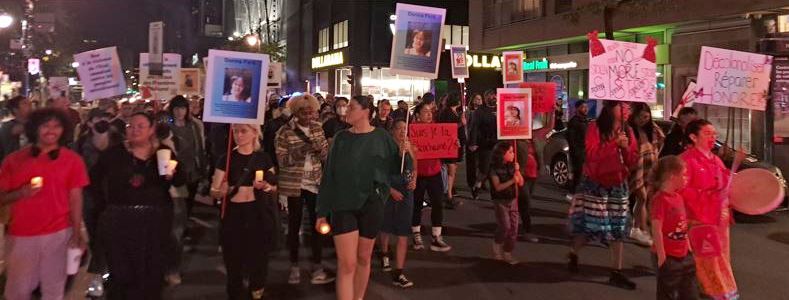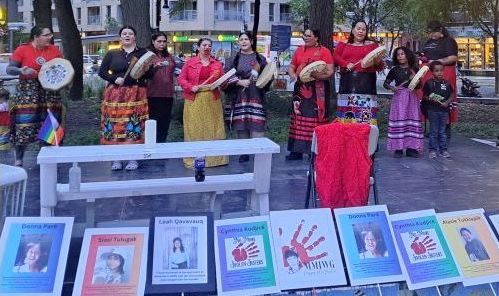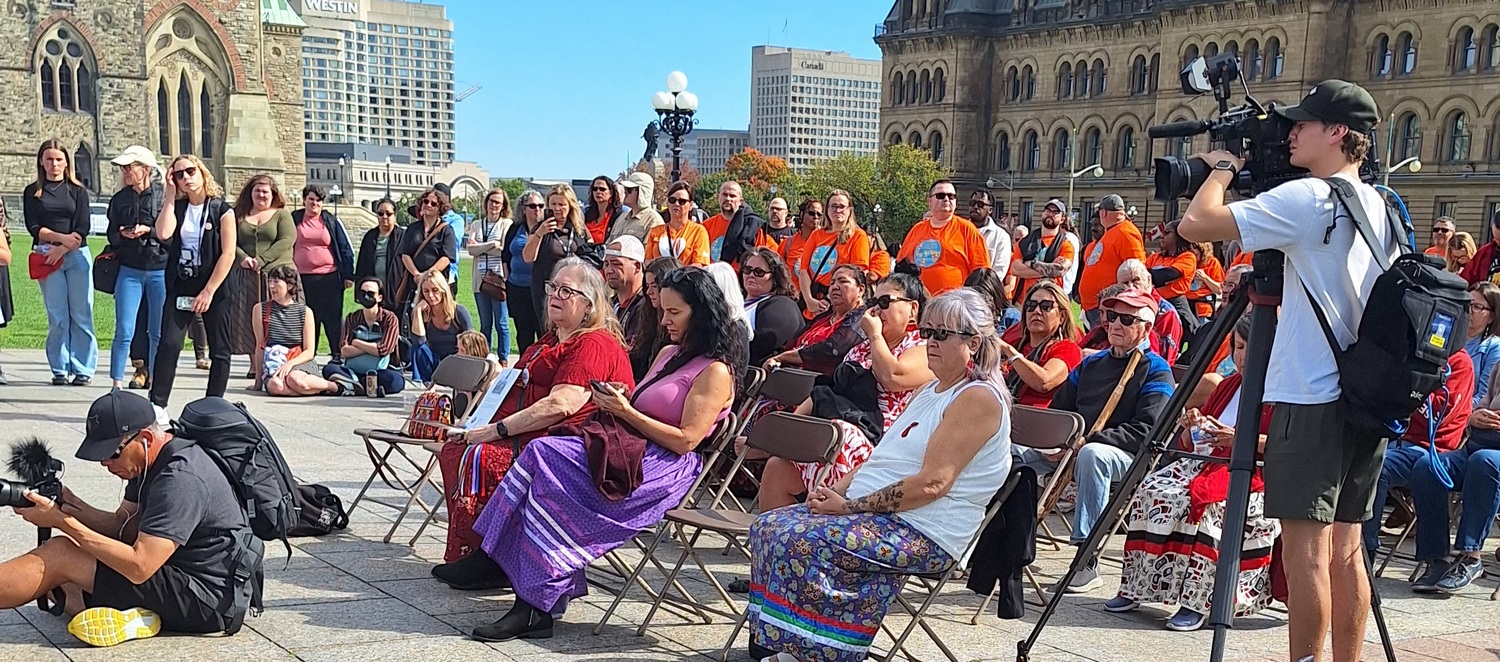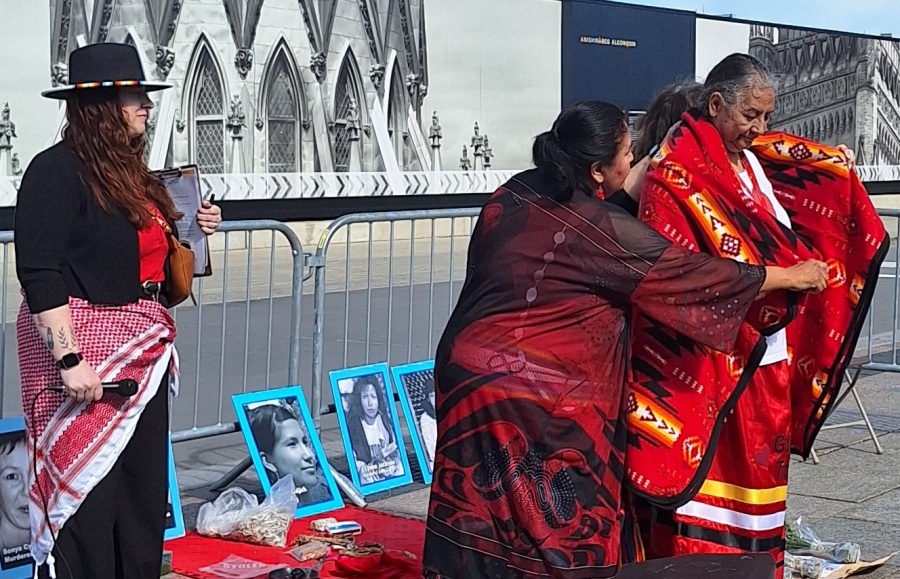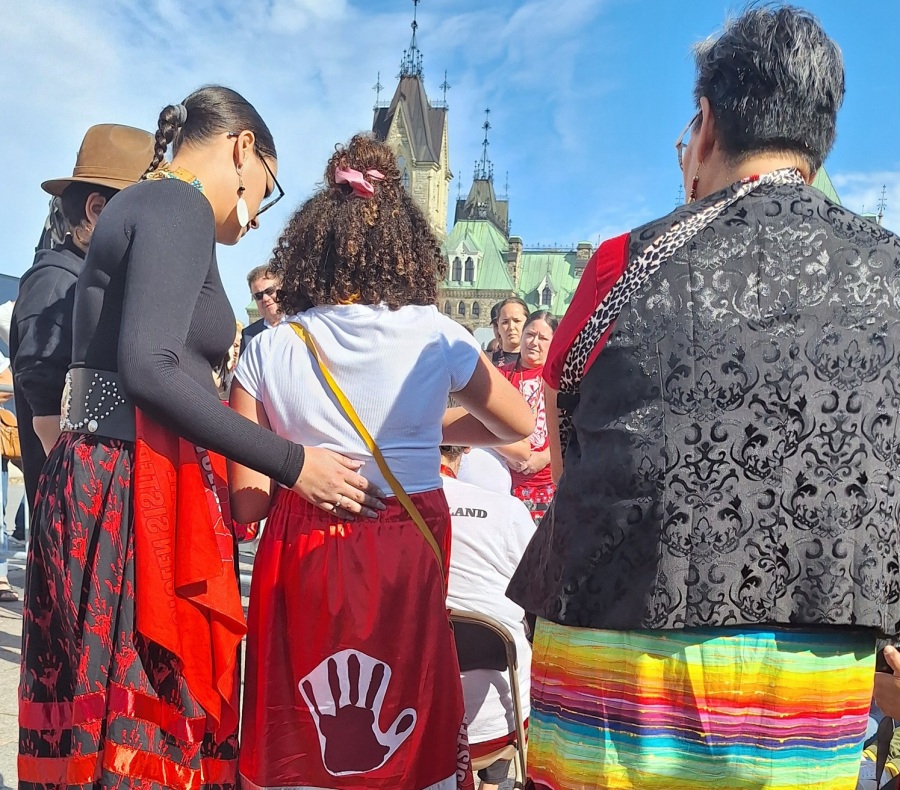Wednesday, December 4, 2024
12 Days of Action to Combat Violence Against Women 2024
Let's Put an End to All Forms of Violence
Against Women and Children!
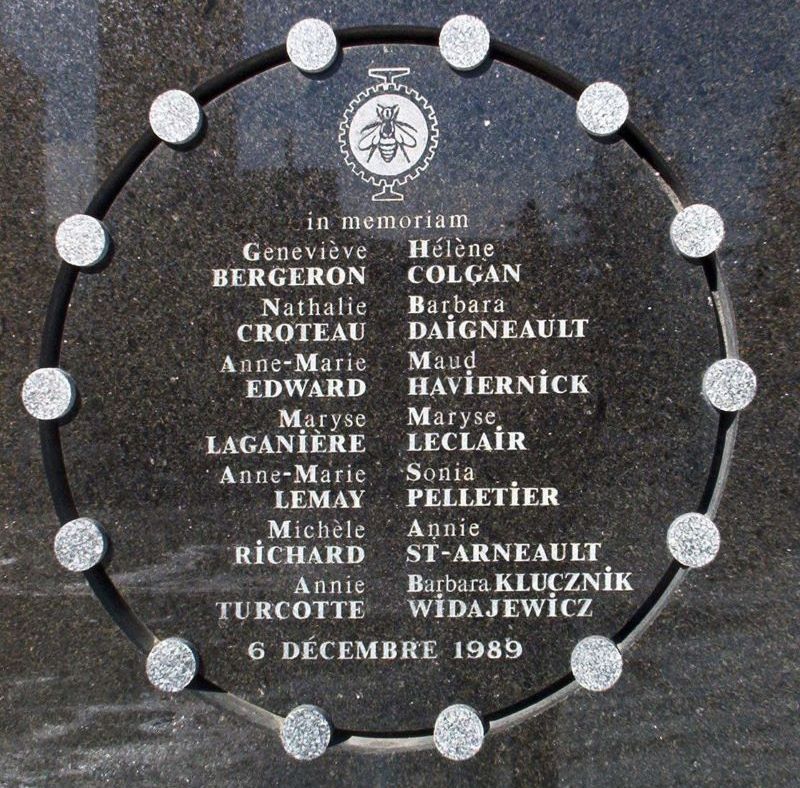
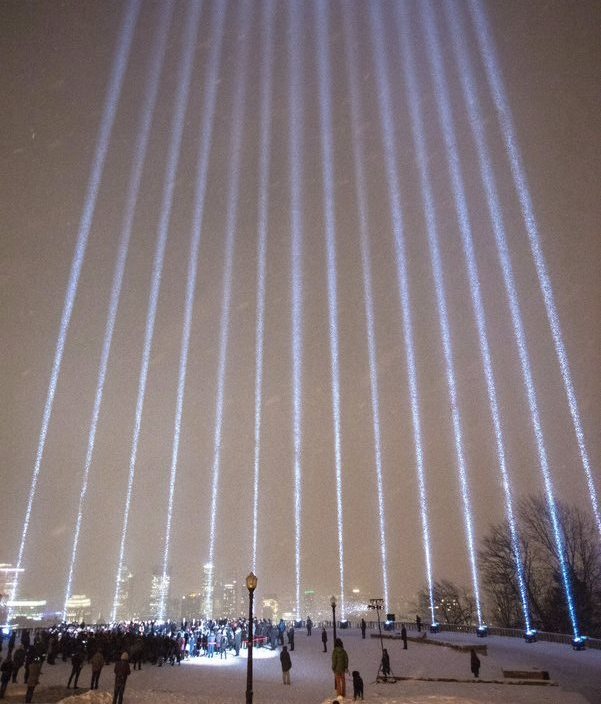
DECEMBER 6
CALENDAR OF EVENTS
• Let's Put an End to All Forms of
Violence Against
Women and Children!
• Society's
Brutality and Violence Against Women
Must Be Eliminated
Take Back the Night
• Annual Halifax
March Affirms Women's Rights and That
Women Are Not Fair Game
Annual Sisters in Spirit Vigils
• Families and Friends Demand Justice for Victims of Violence
12 Days of Action to Combat Violence Against Women 2024
Let's Put an End to All Forms of Violence Against Women and Children!
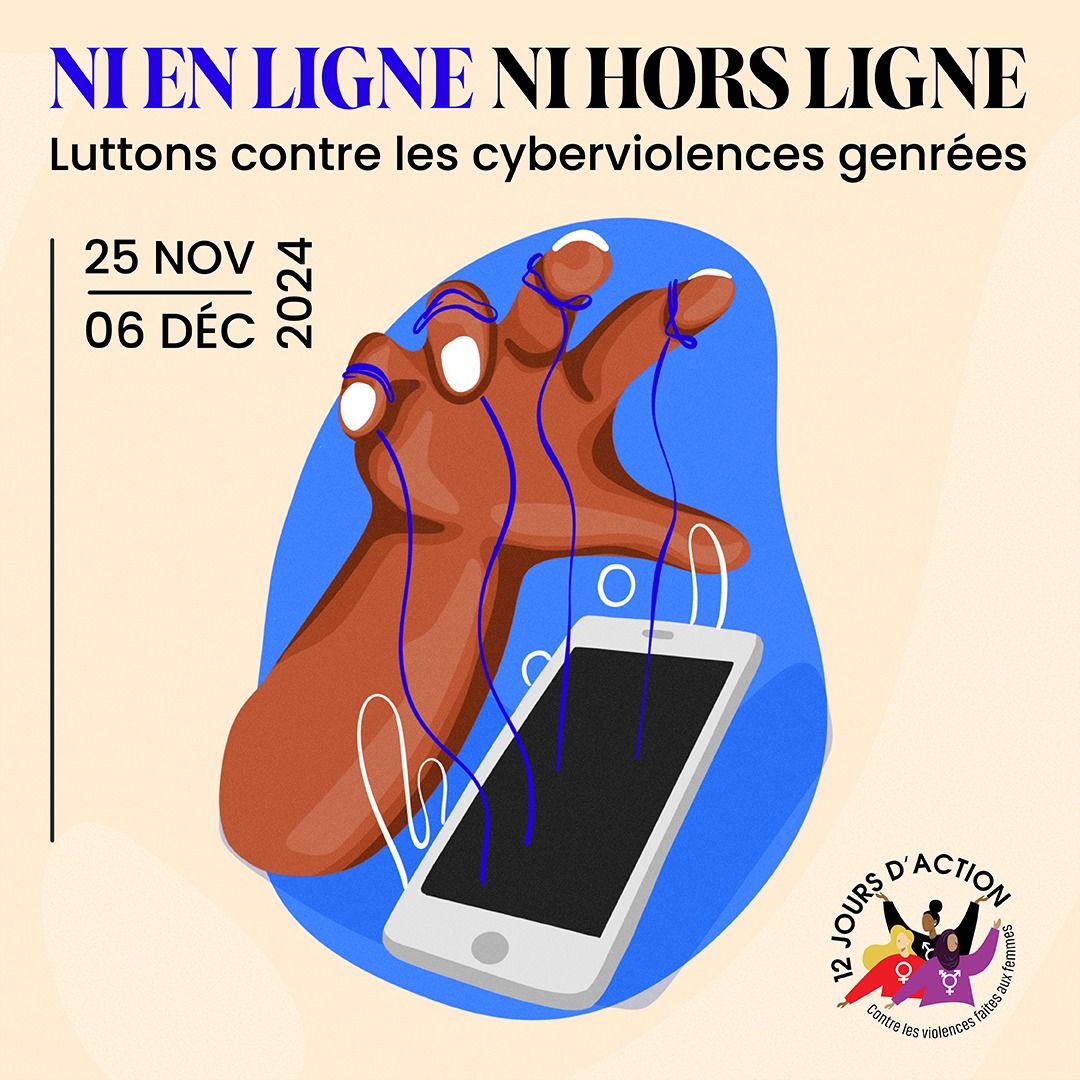 On November 25, the Committee for
the 12 Days of Action against Violence Against Women launched
the 2024 campaign in Quebec under the theme "Neither Online nor
Offline: Let's Fight Against Gendered Cyberviolence." The
committee writes: "Gendered cyberviolence is a covert but
pernicious scourge. It affects women as well as people from
gender or religious minorities or those with disabilities, in
all aspects of their daily lives. With the massive rise of
digital technology, this violence is increasing and taking on
ever more varied forms, manifesting itself in virtual public
spaces such as social networks, online games and forums, but
also in private exchanges."
On November 25, the Committee for
the 12 Days of Action against Violence Against Women launched
the 2024 campaign in Quebec under the theme "Neither Online nor
Offline: Let's Fight Against Gendered Cyberviolence." The
committee writes: "Gendered cyberviolence is a covert but
pernicious scourge. It affects women as well as people from
gender or religious minorities or those with disabilities, in
all aspects of their daily lives. With the massive rise of
digital technology, this violence is increasing and taking on
ever more varied forms, manifesting itself in virtual public
spaces such as social networks, online games and forums, but
also in private exchanges."
Events are being held by women's organizations, rights groups, unions, and municipalities from November 25 until December 6, from Saint-Jean-de-Matha to Quebec City, from Gatineau to Joliette. They include marches, discussions, conferences, film screenings, and commemorative ceremonies. The organizing and events are creating the space to reaffirm their determination to end all forms of violence against them, their children, and all members of society. To see the program in French, click here.
Origins of the Days of Action
In 1999, November 25 was declared the International Day for the Elimination of Violence against Women by the United Nations General Assembly. It called on governments and organizations to take action to raise awareness of this social scourge that threatens the lives, safety and hopes for equality of women. November 25 commemorates the assassination of the Mirabal sisters, three political activists from the Dominican Republic who were brutally murdered in 1960 for their work opposing the dictatorship of Rafael Trujillo. November 25 also marks the beginning of the internationally recognized 16 Days of Activism Against Gender-Based Violence campaign, which ends on December 10, International Human Rights Day.
In Quebec, the 12 Days of Action Against Violence Against Women campaign has been held from November 25 to December 6 every year since 2008. December 6 marks the anniversary of the massacre at the École Polytechnique de Montréal in 1989, when an individual targeting women, shot and killed 14 women and injured ten women and four men. The National Day of Remembrance and Action on Violence Against Women was established by the Canadian Parliament in 1991 to mark this anniversary. Everyone is invited to wear a white ribbon for the day. This year marks the 35th anniversary of the massacre.
The 14 women whose memory is honoured on December 6 are: Geneviève Bergeron, 21, Hélène Colgan, 23, Nathalie Croteau, 23, Barbara Daigneault, 22, Anne-Marie Edward, 21, Maud Haviernick, 29, Barbara Klucznik-Widajewicz, 31, Maryse Laganière, 25, Maryse Leclair, 23, Anne-Marie Lemay, 27, Sonia Pelletier, 28, Michèle Richard, 21, Annie St-Arneault, 23, and Annie Turcotte, 21.
The Fight to End All Forms of Violence
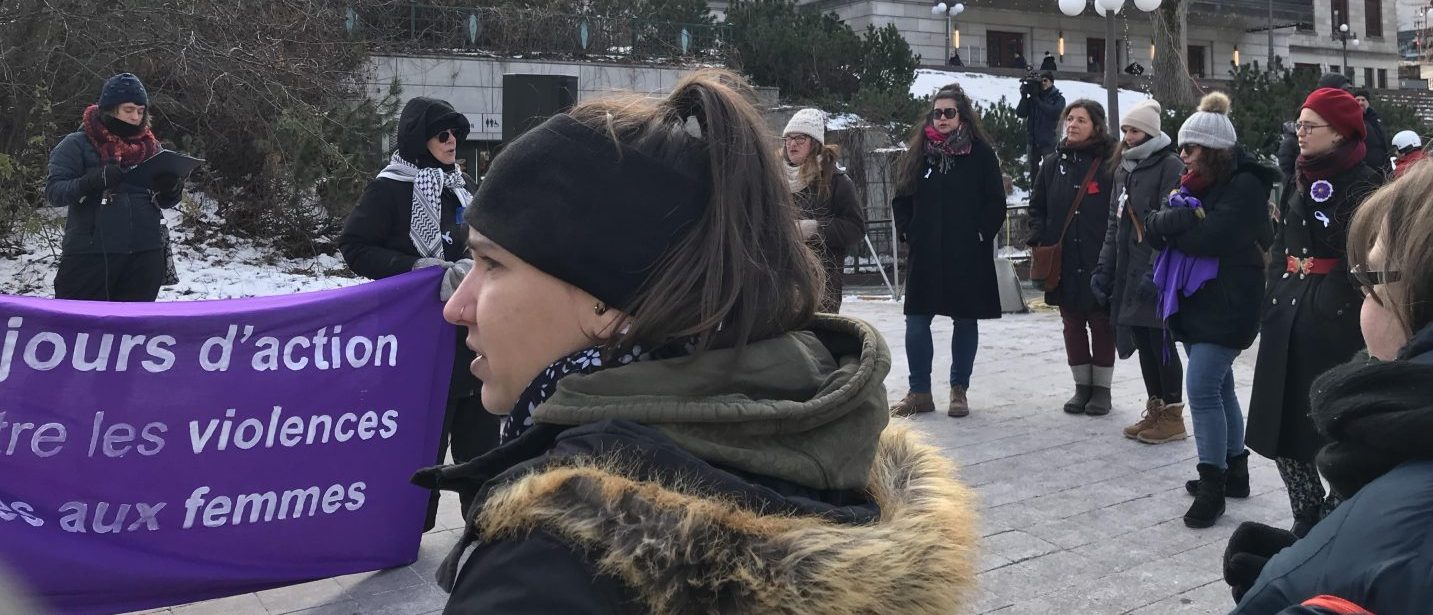
Days of action against violence against women, Quebec City
action November 25, 2023
Women and their collectives have long since identified that the main source of violence is the fact that while they participate in production and reproduction in society, they are excluded from participation in making the decisions that affect them as women, mothers, workers and members of society. In a society where the rights of wealthy private interests reign, human beings are considered disposable, and women are the first victims of the brutality of the ruling elite. This is the social problem that everyone seeks to solve. Political and economic arrangements must be renewed so that everyone is an equal member of the polity. Society must uphold everyone's right to an income that allows them to live in dignity, to have a roof over their heads, to have access to health care and education as well as social programs, as well as the right to live in peace, security and without worry for themselves and their families, and the right to participate in all matters that concern them so as to advance the development of women and all human beings.
The contrast between women's demands to humanize society and the brutality of neo-liberal governments is flagrant. The Trudeau government has given as the theme of this year's 12 Days of Action campaign: "Unite to Act." Condescendingly they say this "underscores the importance of mobilizing all Canadians -- especially men and boys -- to change the social norms, attitudes, and behaviours that contribute to gender-based violence. It is also a call to action that invites us to recognize the signs of gender-based violence and to seek help, for ourselves or for those we love."
This self-serving conception that it is individuals and their behaviour that is to blame for violence against women frees governments from any social and collective responsibility. For them, the issue is having everyone undergo awareness training and educate themselves in order to understand how to behave better! Meanwhile, governments brutally divert social wealth to pay the rich, destroy social programs, and intensify war production in service of the U.S. war machine, a violent and anti-social agenda.
At well-calculated moments, particularly when elections are involved, governments in both Quebec and Canada announce subsidy programs to cover-up social crises, such as in housing and health care. Monies are given to this or that section of society according to the criteria the governments impose, forcing advocacy organizations including women's groups to beg or compete with each other to survive. It does not solve the problems.
Women and their organizations fight in all aspects of life against the violence of a society that does not defend the rights of all, defending their rights as human beings and their rights as women. They demand an end to the anti-social offensive, a new direction for the economy, full participation in society and the power to decide on all issues that concern them. This is the vision and direction they are giving to their struggles.
Society's Brutality and
Violence Against Women
Must Be Eliminated
As the 12 Days of Action Against Violence Against Women, from November 25 to December 6, are underway in Quebec, the situation that women face makes clear the need to change the direction of the economy.
A society that does not take care of women, who are more than half the population, to guarantee them a roof over their heads, education, a livelihood, the specific health care they require including as those who produce the next generation, security of life and mind, demonstrates that it has failed and must be changed. An electoral system that blocks any possibility for women to participate actively in society and decide on all the issues that affect them, that places them at the mercy of governments and private interests that dominate them, needs complete renewal.
Violence against women and girls remains one of the most widespread human rights violations in the world. Worldwide, nearly one in three women has experienced physical and/or sexual violence from an intimate partner, non-partner sexual violence, or both, at least once in their life.
In 2023, at least 51,100 women died as a result of gender-based violence perpetrated by a partner or family members. According to the United Nations, a woman was killed every 10 minutes worldwide in 2023.
In Canada, in 2023, a woman or girl was murdered every 48 hours
The year is not over, but there are already more murders in domestic contexts this year in Quebec than in 2023. In 2024 to date there have been 25 femicides in Quebec.
 Action organized by the Regroupement des groupes de
femmes de la région de la Capitale-Nationale to denounce the
25th femicide in Quebec, November 21, 2024
Action organized by the Regroupement des groupes de
femmes de la région de la Capitale-Nationale to denounce the
25th femicide in Quebec, November 21, 2024
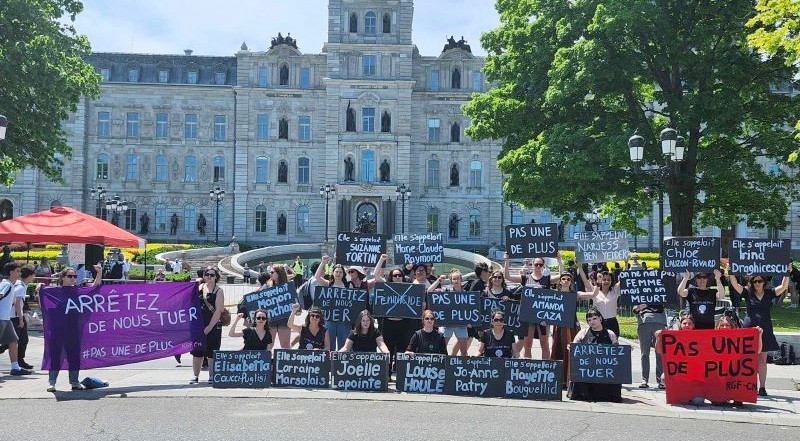 Action organized by the Regroupement des
groupes de femmes de la région de la Capitale-Nationale to
denounce the 15th femicide in Quebec, June 6, 2024
Action organized by the Regroupement des
groupes de femmes de la région de la Capitale-Nationale to
denounce the 15th femicide in Quebec, June 6, 2024
According to the latest statistics available in Quebec, 75 per cent of victims of domestic violence (2022) and 100 per cent of victims of domestic homicide (2021) were women (Institut national de santé publique du Québec; Institut de la Statistique du Québec).
Women and their organizations do not accept the trivialization of violence against women and refuse to give up and accept abuse, assault and killing of women and children. They affirm: violence must not be trivialized, femicides are the tip of the iceberg. For each time there is a femicide, there are thousands of other women who are victims of domestic violence.
There are solutions: increased funding for prevention, support and housing for women who are victims of domestic, sexual and gender-based violence and mandatory and ongoing training on domestic violence for all those who work with women and children. Profound changes to the judicial and political system are needed to put an end to the anti-social offensive of governments that creates an untenable situation in housing, health care, education of the younger generation, the living conditions of families and so many other areas of life. And Canada must end its participation in wars of aggression and occupation in the service of the United States' war agenda which are responsible for the massacre of women and children in Palestine, Lebanon, Haiti and elsewhere.
Enough is Enough!
(With files from UN, UN Women.)
Take Back the Night
Annual Halifax March Affirms Women's Rights and That Women Are Not Fair Game
On the evening of Wednesday, November 26, people taking a stand to end violence against women took to the streets of Halifax for the annual Take Back the Night March. The march began at the Garrison Grounds and continued to Peace and Friendship Park. The march affirmed that no one should be left to fend for themselves, especially the most vulnerable women or those who have survived assault and sexual violence, and that women have the right to safety in their daily lives.
Speech of an Indigenous Woman at the March
As Indigenous women, we understand the importance of protecting our women and girls as well as non-Indigenous women and girls. Sexual violence is a devastatingly common and highly gendered crime, with one-third of Canadian women experiencing sexual violence in their lifetime. This issue goes hand-in-hand with other serious issues in our province. For example, Nova Scotia has the highest rates of intimate partner violence and human trafficking of any province in Canada. Women, both Indigenous and non-Indigenous, make up 79 per cent of all intimate partner violence victims and 97 per cent of human trafficking victims.
An attack on one woman is an attack on all, and therefore we must fight for the safety and security of all women, and people of the world.
It is important to note that Indigenous women are disproportionately targeted by violence. Four in ten Indigenous women have experienced physical or sexual violence by an intimate partner and 55 per cent of Indigenous women have been harmed by non-intimate partners such as acquaintances, friends or strangers. Indigenous women are four times more likely to be victims of violence than other women.
This is due to colonial policies and structures including the Indian Act, the Sixties Scoop, residential schools and breaches of human and Indigenous rights that have led directly to the current increased rates of violence, death, and suicide in Indigenous populations.
As the final report of the National Inquiry into Missing and Murdered Indigenous Women and Girls stated, the link among cultural teachings, identity, and resilience was fractured through the process of colonization -- but not broken. The fact that ceremonies, teachings, and languages do survive today is a testament to those women, those cultural carriers who, along with male, female, and gender-diverse Elders, continue to carry the ancestors as a potential path forward toward healing and safety.
Take Back the Night affirms the right of women to say "No!" to anything interfering with their human person, whether by individuals or by the state through the implementation of laws which dictate what they can or cannot do or say. This incorporates the concept that if you have no right to say NO, then your YES means nothing. Together we need to ensure that every woman not only feels safe but IS safe from any danger or harm. We must collectively support women to participate fully in society without discrimination and without being treated as fair game by anyone.
Being a woman is more than just the ability to bring life into the world, but also the way you care for life already in this world -- whether by protecting and respecting our sisters, daughters, mothers, and friends, or how we take care of our mother earth, the animals, plants and water. We all have a moral obligation and sacred responsibility to break down systemic barriers, eliminate violence, and create safer spaces for Indigenous and non-Indigenous women and girls. Today, hand in hand, we march united with the spirits of our stolen sisters, our sisters who are survivors, and all our sisters and allies and say No More Stolen Sisters!
Video
Annual Sisters in Spirit Vigils
Families and Friends Demand
Justice
for Victims of Violence
This year is the 18th year of Sisters in Spirit vigils calling for justice for the thousands of missing and murdered Indigenous women and girls across Canada and Quebec. The annual vigils hold the Canadian government to account for the conditions that foster violence against Indigenous women and girls who suffer from inhuman social conditions, the aftermath of residential schools and other genocidal colonial arrangements. The vigils are a bold rejection of the callous indifference of the state to the plight of Indigenous Peoples and a moving expression of social love for the thousands of women -- daughters, mothers, aunties and grandmothers -- whose lives have been lost over the decades.
Montreal
On the evening of October 4, close to 100 people participated in the Annual Memorial Vigil for Missing and Murdered Indigenous Women, Girls, Trans and Two-Spirit People. They gathered in Montreal's Cabot Square, then marched to Place du Canada, to the place where the John A. McDonald monument used to stand before it was toppled.
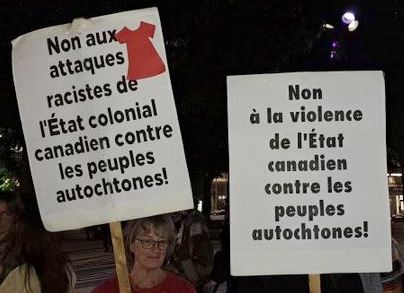
"The reason we are here," said one speaker, "is because of our sisters, our mothers, our aunties, our nieces, and our daughters. We're here to acknowledge them and to remind everybody that they matter and that it's our responsibility to keep looking for them because no one else is taking on that cause."
This year's action highlighted the unsolved cases of five Inuit women found deceased by hanging in the Cabot Square area since 2011 and the demand that these cases be solved; the one-year anniversary of the death of Alasie Tukkiapik, a 41-year-old Inuk woman; the situation facing young Indigenous girls living in group homes, who often run away due to poor conditions, further exposing themselves to danger; the failure of Quebec's child welfare system to listen to Indigenous children and separating families unnecessarily and the demand for better treatment of those children and for their voices to be heard.
Participants were called on to:
- Continue to demand that organizations fulfill their obligations to Indigenous women, girls, and two-spirit and gender-diverse people as set out by the National Inquiry on Missing and Murdered Indigenous Women and Girls;
- Raise awareness about the epidemic of missing and murdered Indigenous women and girls, which has persisted since colonization began.
- Fight for justice and keep the stories of missing and murdered Indigenous women and girls alive, as their cases are often ignored or met with inaction.
- Implement meaningful and effective strategies to address the devastating impacts of colonization on Indigenous Peoples.
- Ensure the safety and security of Indigenous children and future generations by taking matters into our own hands and changing the course of the future.
- Acknowledge and honour the experiences and resilience of Indigenous families affected by violence and loss.
During the march along busy St. Catherine Street, marchers shouted slogans such as No Justice, No Peace! What Do We Want? Justice! When Do We Want It? Now! and onlookers were invited to join the march.
A cultural component was also part of the event, including singing by Indigenous women and girls, throat singing and drumming.
At the end of the action, hot drinks were served and one and all were encouraged to step up the struggle in defence of Indigenous women and girls.
Ottawa
A dignified and moving ceremony was held by Families of Sisters in Spirit in Ottawa on October 4, the 18th year of Sisters in Spirit vigils on Parliament Hill on Algonquin territory, and the 20th anniversary of Amnesty International's report, Stolen Sisters, A human rights response to discrimination against Indigenous women in Canada.
As organizer Bridget Tolley pointed out: "We are here to remember all our Indigenous sisters gone missing or murdered, to remind everyone that we are still waiting for help for our murdered and missing Indigenous women and their families. We've been asking for truth, accountability and justice for everyone. What happened to the recommendations 20 years ago? How many recommendations have there been since, and how many have been done?"
Opening prayer was said by Angie Bear, who had just arrived from a fire ceremony in Saskatchewan, where elders gave her a blanket which she wrapped around Bridget to help her with her loss and her work in keeping the memory of Indigenous women and girls alive.
As part of the ceremony, Bridget cut off a lock of her hair as an expression of the sacrifices and suffering of Indigenous people and the demand that it stop. While people formed a circle around Bridget and her granddaughter and great granddaughter to protect the ceremony, singers performed a powerful rendition of the Strong Woman's Song which was written by Indigenous women in the prison for women in Kingston. Bridget's lock of hair was placed in a smudge bowl.
A rose ceremony was also held for Chanel Charette, a young Anishinaabe woman who was struck down by a driver while riding her bicycle in Vanier. She died two days later on September 26. Her cousin and friends were present to share their grief and honour her memory.
Dr. Beverley Jacobs, a law professor and Mohawk from the Six Nations of the Grand River, who was the president of the Native Women's Association of Canada from 2004 to 2009, spoke of her work with Amnesty International, meeting with families across the country who shared their grief and pain of having lost a loved one. She said that people who are searching for their missing mothers or sisters, or who have to stop working to participate in a court case which reveals all the gruesome details of what happened to their loved one, need resources on many levels to cope with these challenges. She also pointed out that what is happening to Indigenous people is an international matter. "Across the world, we are targets," she said. In reference to dealing with government and police inaction or indifference, she said "We need to figure out what we need to do. We need a process to help the families going through the courts, to prepare them, to accompany them," adding that this initiative must be taken up by Indigenous Peoples themselves.
(To access articles individually click on the black headline.)
Website: www.cpcml.ca • Email: editor@cpcml.ca


